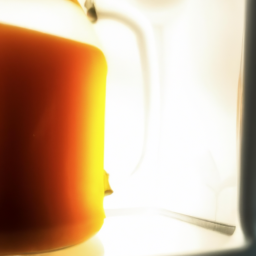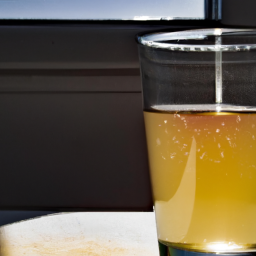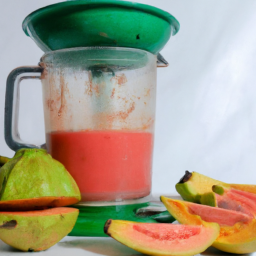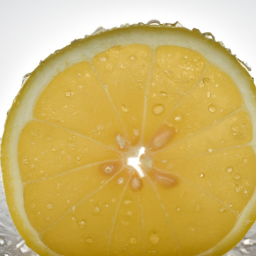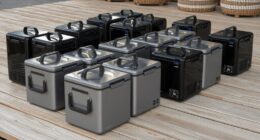As someone who enjoys a glass of apple juice with breakfast or as a refreshing drink throughout the day, I have often wondered about the expiration date of this delicious beverage. How long can it last in the refrigerator? Can it be frozen for later use? And most importantly, how can I determine if it has gone bad? These inquiries are essential when it comes to apple juice.
In this article, I will explore the science behind the shelf life of apple juice, including the factors that affect its freshness, how to properly store it in the fridge, and the signs to watch out for when it starts to spoil. Whether you prefer freshly squeezed or store-bought apple juice, understanding how to keep it fresh and safe for consumption is key to enjoying this beloved beverage to the fullest.
So, let’s dive in and learn more about how long apple juice lasts in the fridge.
Key Takeaways
- Freshly squeezed apple juice lasts 3-5 days in the fridge.
- Once opened, store-bought apple juice should be consumed within 7-10 days.
- The ideal temperature range for storing apple juice is between 32°F to 40°F.
- Storing apple juice in the fridge prolongs its shelf life and preserves its freshness.
The Shelf Life of Freshly Squeezed Apple Juice
If you’re wondering how long your freshly squeezed apple juice will last in the fridge, the answer is typically around 3-5 days. This is because fresh apple juice lacks the preservatives that are usually added to store-bought versions, which can extend their shelf life.
To ensure that your fresh apple juice stays fresh for as long as possible, it’s important to store it properly. To maximize apple juice preservation, it’s best to store fresh apple juice in an airtight container, such as a glass jar or plastic bottle, in the refrigerator. Make sure the container is sealed tightly to prevent air from getting in, which can cause the juice to spoil faster.
Additionally, be sure to keep the juice away from other foods in the fridge that could contaminate it. By following these guidelines, you can enjoy your fresh apple juice for up to 5 days.
When it comes to store-bought apple juice, however, the shelf life may vary depending on the type of juice and the preservatives used.
The Shelf Life of Store-Bought Apple Juice
When you buy apple juice from the store, it’ll stay fresh for a certain amount of time. The shelf life of store-bought apple juice depends on several factors, including the type of packaging, the storage conditions, and the processing method used.
Typically, unopened apple juice can last for up to one year when stored in a cool and dry place. However, once you open the bottle, the juice’s shelf life decreases significantly. One way to tell if apple juice has gone bad is to check for any changes in color, smell, or taste.
If the juice appears cloudy or has a sour smell, it’s likely that it has gone bad and should be disposed of immediately. Additionally, if the juice has an off taste or is fizzy, it’s a sign that the juice has started to ferment and should not be consumed. To properly dispose of expired apple juice, pour it down the sink and rinse the container thoroughly with hot water.
The type of container affects shelf life, as we’ll explore in the next section.
The Type of Container Affects Shelf Life
Did you know that choosing the right container for apple juice storage is important to keep it fresh for longer? The type of container you use can affect the flavor and quality of the apple juice. Glass or plastic containers with tight-fitting lids are the best options as they prevent air from entering the container, which can cause the apple juice to spoil quickly.
Moreover, the impact of temperature on apple juice freshness cannot be ignored. The ideal temperature range for storing apple juice is between 32°F to 40°F. If the temperature rises above this range, the apple juice may start to ferment and develop a sour taste.
Therefore, it is essential to store apple juice in a cool place, away from direct sunlight and heat sources, to ensure its freshness and quality.
Now, let’s talk about how long apple juice lasts in the fridge.
Storing Apple Juice in the Fridge
To keep your refreshing glass of apple juice tasting its best, make sure to store it in the fridge using a sealed container and avoid exposing it to heat or sunlight. Storing apple juice in the fridge prolongs its shelf life and preserves its freshness. It is important to note that once opened, apple juice should be consumed within 7 to 10 days, even if it is stored in the fridge.
To ensure that you are storing your apple juice correctly, it is best to use a container that is specifically designed to preserve the freshness of the juice. Glass containers or plastic bottles with airtight lids are great options for storing apple juice in the fridge. Below is a table outlining some of the best apple juice brands and their recommended storage methods:
| Brand | Storage Method | Shelf Life |
|---|---|---|
| Simply Apple | Refrigerate after opening | 7-10 days |
| Martinelli’s | Refrigerate after opening | 7-10 days |
| Tree Top | Refrigerate after opening | 7-10 days |
If you have more apple juice than you can drink within the recommended time frame, freezing the juice is a great option to extend its shelf life.
Freezing Apple Juice
I’ve always wondered if it’s possible to freeze apple juice and how long it lasts in the freezer.
After doing some research, I found out that you can freeze apple juice, and it’s a great way to prolong its shelf life.
To freeze apple juice, simply pour it into a freezer-safe container, leaving some space at the top for expansion, and then seal it tightly.
Frozen apple juice can last up to 8 months in the freezer if stored properly.
Can You Freeze Apple Juice?
Freezing apple juice is a popular method for extending its shelf life, but does it truly maintain its taste and quality? As someone who’s tried freezing apple juice before, I can attest that the taste isn’t quite the same as fresh juice.
However, freezing apple juice can still be useful for creating creative recipes using frozen apple juice, such as frozen apple juice popsicles or using it as an ingredient in smoothies or cocktails.
When it comes to the taste of frozen apple juice, it’s important to note that freezing affects the texture and flavor of the juice. The freezing process can cause the juice to separate, resulting in a less smooth and slightly grainy texture. Additionally, the flavor of the juice may be slightly altered, with some of the natural sweetness being lost in the freezing process.
Despite these changes, frozen apple juice can still be a convenient and cost-effective way to enjoy apple juice throughout the year.
If you’re interested in learning how to freeze apple juice, it’s important to properly store the juice in an airtight container or freezer bag to prevent freezer burn. Additionally, make sure to leave some room at the top of the container for the juice to expand as it freezes.
By following these simple steps, you can enjoy the benefits of frozen apple juice in your favorite recipes all year round.
How to Freeze Apple Juice
By placing the refreshing and sweet apple nectar in a tightly sealed container and leaving some space at the top, you can freeze it and have a refreshing glass of icy apple juice anytime. Freezing apple juice is an excellent way to preserve it for future use. It is also a great way to reduce waste and save on expenses. Once frozen, you can use apple juice for creative uses and DIY projects like making apple juice popsicles, apple juice ice cubes, and apple juice granita.
To freeze apple juice, start by choosing a freezer-safe container that is the right size for the amount of juice you have. Make sure to leave some space at the top of the container to allow for expansion during freezing. Then, pour the apple juice into the container and seal it tightly. Label the container with the date and place it in the freezer. The table below provides a guide on how long you can freeze apple juice for optimal quality and flavor.
| Freezer Temperature | Frozen Apple Juice Shelf Life |
|---|---|
| 0°F or lower | 8-12 months |
| 10°F | 6-9 months |
| 20°F | 4-6 months |
| 30°F | 1-2 months |
As you can see, the colder the freezer temperature, the longer the frozen apple juice will last. However, it is important to note that while frozen apple juice may last for several months, its quality and flavor may deteriorate over time. In the next section, we will discuss how long frozen apple juice lasts and how to tell if it has gone bad.
How Long Frozen Apple Juice Lasts
To keep your icy apple nectar fresh and sweet as a summer breeze, imagine a snowman in your freezer and remember to label and store it properly for up to a year.
Frozen apple juice is a great addition to your pantry, especially if you love baking. You can use it in recipes like apple pies, apple tarts, and apple muffins.
Aside from using it as a baking ingredient, you can also thaw it to make a refreshing apple juice or apple cider drink.
When it comes to thawing frozen apple juice, the best way is to transfer it to the refrigerator and leave it overnight. This allows the juice to thaw slowly, maintaining its flavor and texture. If you’re in a hurry, you can thaw it quickly by placing the frozen juice in a bowl of warm water.
Do not use a microwave to thaw frozen apple juice as this can affect its taste and quality.
As we’ve learned how to thaw frozen apple juice, the next step is to know how to spot signs of spoiled apple juice.
Signs of Spoiled Apple Juice
You’ll know when your apple juice has gone bad if it has a funky smell or taste. Spoiled apple juice may also have a cloudy appearance or fizziness, indicating fermentation. Another sign is the presence of mold or yeast growth. If you notice any of these signs, it’s best to discard the juice.
To prevent apple juice spoilage, it’s important to store it properly. Keep it refrigerated at all times and consume it within 7-10 days after opening. Airtight containers can also help to prevent contamination and prolong freshness. Additionally, be sure to check the expiration date before purchasing apple juice.
With these precautions, you can enjoy fresh and flavorful apple juice for longer. Moving on to tips for keeping apple juice fresh, one effective method is to freeze it in ice cube trays for later use.
Tips for Keeping Apple Juice Fresh
As the autumn season approaches, your taste buds crave the sweet and crisp flavor of freshly squeezed apple nectar, and with a few simple tricks, your glass can be filled to the brim with the same refreshing taste every time. To keep your apple juice fresh and tasty, you need to store it properly. Here are some tips for keeping apple juice fresh:
| Tip | Explanation |
|---|---|
| Keep it refrigerated | Apple juice should always be kept in the fridge, as it helps to slow down the oxidation process. This process causes the juice to lose its flavor and color over time. |
| Use airtight containers | Exposure to air can cause the juice to spoil faster. It is essential to store your apple juice in an airtight container to prevent air from getting inside. |
| Consume within 7 days | Apple juice can last up to 7 days in the fridge. After that, it starts to lose its freshness and flavor. It is best to consume it within the first week of opening the bottle. |
In addition to these tips, there are many creative recipes you can try with apple juice. You can use it as a base for smoothies or cocktails, or even use it as a marinade for meat. If you want to switch things up, try juicing alternatives like pears, carrots, or oranges to create unique and delicious blends.
When your apple juice has expired, there are still ways to use it. Stay tuned for the next section, where we will explore some creative ways to use expired apple juice.
Using Expired Apple Juice
Hey there, got expired apple juice sitting in your fridge? Don’t toss it out just yet, there are plenty of ways to give it a new life!
One way to repurpose expired apple juice is to use it as a cooking ingredient. Apple juice can be used in marinades, sauces, and dressings to add a sweet and tangy flavor to your dishes. You can also use it as a substitute for other liquids in baking, such as milk or water, to add a hint of apple flavor to your baked goods.
Another way to use expired apple juice is as a base for homemade vinegar. Mix the apple juice with a bit of vinegar mother (the live bacteria used to ferment vinegar) and let it sit in a warm, dark place for a few weeks. You’ll have homemade apple cider vinegar that can be used in cooking, cleaning, and even as a natural remedy for various ailments.
Now, if you’re wondering about the benefits of drinking apple juice, let’s dive into that next.
Benefits of Drinking Apple Juice
I’m excited to discuss the benefits of drinking apple juice!
Not only is it a delicious and refreshing beverage, but it’s also packed with essential nutrients like vitamin C and potassium.
Additionally, studies have shown that drinking apple juice may improve heart health, digestion, and cognitive function.
Nutritional Value of Apple Juice
You can easily incorporate apple juice into your diet because it’s rich in essential vitamins and nutrients. Apple juice is made from the processing of apples and comes in different types such as clear, cloudy, and organic. Here are some of the nutritional benefits of drinking apple juice:
-
High in Vitamin C: Apple juice contains a high amount of Vitamin C, which strengthens the immune system and helps prevent chronic diseases.
-
Rich in Antioxidants: Apple juice contains antioxidants such as flavonoids and polyphenols that help reduce inflammation and protect against cell damage.
-
Good Source of Fiber: Apple juice contains soluble fiber that helps regulate digestion and reduces the risk of heart disease.
-
Natural Energy Boost: Apple juice contains natural sugar that provides an energy boost without the crash that comes from artificial sweeteners.
-
Lowers Cholesterol: Apple juice contains pectin, a soluble fiber that helps lower LDL cholesterol levels.
These benefits make apple juice a healthy addition to your diet. Drinking apple juice regularly can help improve your overall health and well-being. Moving on to the next subtopic, let’s explore the many health benefits of drinking apple juice.
Health Benefits of Drinking Apple Juice
If you’re looking for a delicious way to improve your health, incorporating apple juice into your daily routine can provide a multitude of benefits. Apple juice is not only refreshing, but it also contains important nutrients such as vitamins A and C, potassium, and antioxidants. These nutrients play a crucial role in keeping your body healthy and functioning properly.
One of the key benefits of drinking apple juice is that it can boost your immune system. Apples contain a type of fiber called pectin, which has been shown to have prebiotic effects, meaning it helps feed the good bacteria in your gut. This can strengthen your immune system and reduce your risk of getting sick. Additionally, apple juice is rich in antioxidants, which can help to reduce inflammation, regulate digestion, and lower cholesterol levels. With so many health benefits, it’s no wonder that apple juice is a popular beverage choice for many. If you’re looking to incorporate apple juice into your diet, there are plenty of delicious apple juice recipes to try and different types of apples to choose from for juicing.
Frequently Asked Questions
Can I mix fresh and store-bought apple juice?
I would not mix fresh and store-bought apple juice as they have different flavors and consistencies. Fresh juice has a more intense taste and can be thicker, while store-bought juice may have preservatives and a milder taste.
Does adding sugar or other sweeteners affect the shelf life of apple juice?
Sweeteners can affect the preservation of apple juice. The addition of sugar can increase the risk of spoilage, as it provides a food source for bacteria. Proper storage and pasteurization are crucial for extending shelf life.
Can I store apple juice in a glass jar instead of a plastic bottle?
Did you know that glass is a better option than plastic for storing apple juice? Not only is it more environmentally friendly, but it also doesn’t contain harmful chemicals. So, yes, you can store apple juice in a glass jar without any concern about its shelf life.
Is it safe to drink apple juice after it has been left out of the fridge for a few hours?
It is not recommended to drink apple juice that has been left out of the fridge for a few hours. The drinking temperature and shelf stability of the juice are compromised, increasing the risk of bacterial growth and spoilage.
Can I use apple juice that has been frozen and thawed in a recipe that calls for fresh apple juice?
I have successfully used frozen apple juice in recipes calling for fresh juice by properly thawing it in the fridge and storing any unused portions in a sealed container in the fridge for up to a week. Follow thawing and storage guidelines for best results.
Conclusion
In conclusion, knowing how long apple juice lasts in the fridge can help you enjoy its delicious taste for longer. Whether it’s freshly squeezed or store-bought, the shelf life of apple juice depends on various factors such as the type of container used, storage conditions, and expiration date.
By storing apple juice in the fridge and freezing it if necessary, you can extend its shelf life and prevent spoilage. However, if you notice any signs of spoiled apple juice, such as a sour odor or cloudy appearance, it’s best to discard it.
On the other hand, if you have expired apple juice, you can still use it for cooking or baking. Drinking apple juice has numerous benefits for your health, such as improving digestion, boosting immunity, and reducing the risk of chronic diseases.
So, next time you sip on a glass of apple juice, savor its crisp and refreshing taste while reaping its health benefits.
